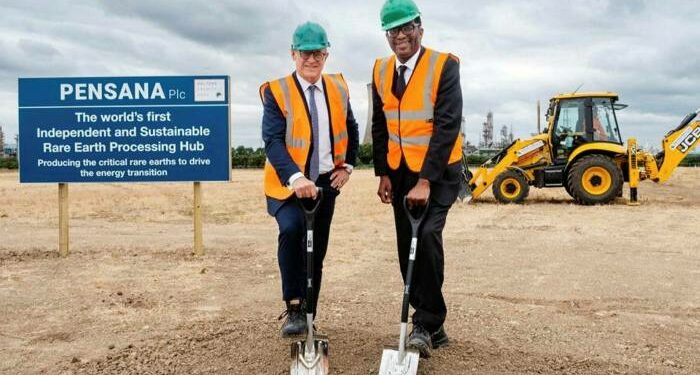The UK has put millions of pounds of taxpayers’ money behind a £150mn rare earths processing site in northern England as part of the launch of the country’s first critical minerals strategy to weaken China’s stranglehold on vital materials used in electric cars, wind turbines and fighter jets.
The government’s first undisclosed investment to strengthen its supply of critical minerals goes into a project run by London-listed Pensana to turn rare earth oxides into metals — crucial ingredients for magnets needed in the automotive and renewable sectors.
Industry experts have raised concerns over Pensana’s level of disclosure, the quality of its resources and executive pay, as well as saying its goal to produce 12,500 tonnes of separated rare earths and 5 per cent of global magnet metal production by 2024, is overly ambitious.
China controls about 80 per cent of the global processing capacity for rare earths — a set of 17 elements that are difficult to process in large quantities. Beijing has used its domination of the rare earths supply chain to gain a geopolitical advantage, embargoing exports to Japan over a territorial dispute in 2012.
“China dominates the sector and China is going to consume all of its rare earth resources for its own production,” said Paul Atherley, chairman of Pensana. South Korea and Japan would initially buy material produced at the facility in Hull for magnet production until the UK has domestic magnet manufacturing capabilities, he said.
The secure supply of metals has risen up the agenda of western governments after Russia, a huge producer of nickel and platinum, waged war on Ukraine.
“We just have to look at the gas situation in Europe where Germany is overdependent on Russian gas,” Kwasi Kwarteng, secretary of state for business, told the Financial Times. “You do need sovereign capability here in the UK.”
But some rare earth experts are pessimistic about Pensana being the one to help the UK do that. The company needs to raise $250mn by the year-end and plans to import rare earth oxides from its Longonjo mine in Angola — where construction is also only just starting.
The ore will be processed in Angola first to produce the rare earth oxides which will then be separated into metal at the Hull facility.
But industry experts are troubled by the risks attached to the project. Thomas Kruemmer, author of the Rare Earth Observer blog with 10 years of industry experience, said processing the ore in Angola would generate large volumes of thorium, a radioactive material, likely requiring the involvement of the UN nuclear watchdog, the International Atomic Energy Agency.
“There’s a lot of hot air and promises,” he said, adding that miners listed in Canada or Australia would have been required to release far more information in feasibility studies.
Per Kalvig, senior researcher at the Center for Minerals & Material, echoed those concerns and warned that processing ore and transforming it to the refined metal products used in high-tech magnets normally involves several specialist processing companies.
“The plan for full production in 2024 doesn’t sound feasible, unless Pensana very soon announce that they will team up with an experienced partner,” he said. “The required expertise on the mine-to-magnet value-chain is not developed overnight”.
Atherley, who previously raised $120mn from investors for a uranium project in Spain which was never built, will receive £275,000 a year, which can rise to £750,000 with bonuses.
Pensana chief executive Tim George’s base salary is £300,000, which can rise to £1.2mn, according the company’s annual report. Industry figures say executives at small-cap miners with salaries above £250,000 is typically a red flag.
Atherley said the company would store thorium in tailings facilities in Angola, its financiers were happy with its studies and his salary is nothing unusual compared with lawyers and brokers in the City of London.
The UK on Friday released its critical minerals strategy to bolster the country’s supply of metals vital to the energy transition such as lithium, graphite and silicon.
The document provided no new funding but it said the government would use existing funds to support domestic mining projects and to work with development banks to use aid to support mineral projects overseas.











